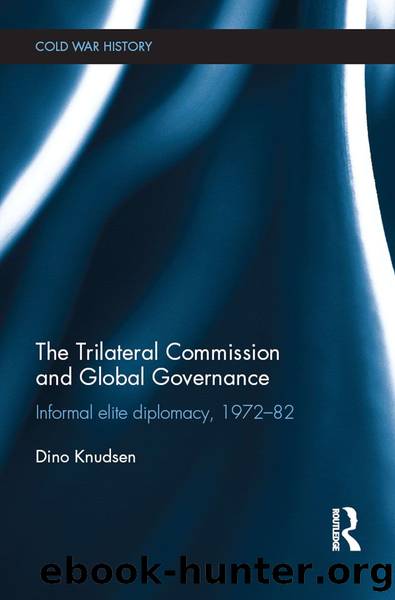The Trilateral Commission and Global Governance: Informal Elite Diplomacy, 1972-82 (Cold War History) by Dino Knudsen

Author:Dino Knudsen [Knudsen, Dino]
Language: eng
Format: azw3
ISBN: 9781317392057
Publisher: Taylor and Francis
Published: 2016-05-11T16:00:00+00:00
The oil crisis, the Third Window, and policy impact
The oil crisis shook the developed countries. For the TriCom, the moment constituted both a major crisis, as the trilateral regions became divided based on their different interests, and an opportunity to test its assumptions of advancing a trilateral community. Kohnstamm thought the world was facing the most serious situation since the war. âUnless the trilateral countries get together on this,â he said, âthey will fall apart more generally, with serious international consequences and domestic strains in many countries.â Kohnstamm even worried about the prospect of âPopular Front governments all around the Mediterranean,â but he also saw opportunities. âIf there ever was a moment when a Commission like ours could fill a crucial role,â he elaborated, âit is now.â45
The TriCom seized the opportunity and issued two reports on energy. The reports assumed that the era of cheap and abundant oil was over, and recommended developing new sources of energy. The reports anticipated a politicization of international economic relations and warned against destructive competition between the trilateral countries, which had to preserve their democratic institutions, but be ready to modify habits and lifestyles. The US, which was in a comparatively strong position compared to its trilateral partners, should not take refuge in a policy of self-sufficiency, and a whole range of concrete steps was to be taken to secure cooperation and adequate supplies of oil (conservation, sharing, new technology, etc.). The reports recommended that the trilateral countries in particular, and the oil consumers in general, should unite and approach OPEC in a cooperative fashion, and work to set up an international energy agency. Cooperation should not only deal with energy, but also with political problems such as the ArabâIsraeli conflict to avoid future crisis.46
Although the poorest countries of the world had much lower energy consumption than the industrialized countries, they were severely hit by the oil crisis and did not have the same capacity to resist it. A third report on the oil crisis, OPEC, the Trilateral World, and the Developing Countries: New Arrangements for Cooperation, 1976â1980, included measures to prevent chaos and destabilization of international order. One of the problems for the developing countries was that the World Bankâs standard lending facility, the so-called âFirst Window,â and its fund for the poorest countries, the International Development Association, the so-called âSecond Window,â could not meet the demands of the immediate crisis for several reasons. Thus the report advocated the establishment of a new lending facility, a âThird Window,â an interim measure providing emergency financing over the following years for the poorest countries.47
The Intermediate Financing Facility, or the Third Window, of the World Bank was eventually established. Negotiations in the bank began in early 1975 and concluded that summer. Before and during the official negotiations, the TriCom displayed an impressive diplomatic effort. In December 1973, meetings between the writers and selected Commissioners began. On March 18, 1974, the writers met at Brookings Institution to advance their work with the report. Gardner stressed that what
Download
This site does not store any files on its server. We only index and link to content provided by other sites. Please contact the content providers to delete copyright contents if any and email us, we'll remove relevant links or contents immediately.
| Elections & Political Process | Ideologies & Doctrines |
| International & World Politics | Political Science |
| Public Affairs & Policy | Specific Topics |
| United States |
The Secret History by Donna Tartt(19053)
The Social Justice Warrior Handbook by Lisa De Pasquale(12187)
Thirteen Reasons Why by Jay Asher(8893)
This Is How You Lose Her by Junot Diaz(6877)
Weapons of Math Destruction by Cathy O'Neil(6265)
Zero to One by Peter Thiel(5786)
Beartown by Fredrik Backman(5737)
The Myth of the Strong Leader by Archie Brown(5500)
The Fire Next Time by James Baldwin(5431)
How Democracies Die by Steven Levitsky & Daniel Ziblatt(5215)
Promise Me, Dad by Joe Biden(5141)
Stone's Rules by Roger Stone(5081)
A Higher Loyalty: Truth, Lies, and Leadership by James Comey(4954)
100 Deadly Skills by Clint Emerson(4921)
Rise and Kill First by Ronen Bergman(4779)
Secrecy World by Jake Bernstein(4741)
The David Icke Guide to the Global Conspiracy (and how to end it) by David Icke(4708)
The Farm by Tom Rob Smith(4502)
The Doomsday Machine by Daniel Ellsberg(4484)
